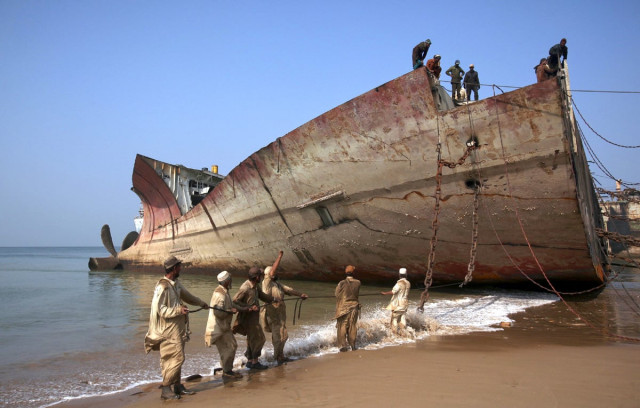Billets vs ship plates - tax benefits or a level playing field?
Steel melters call for imposing taxes on ship-breakers, who insist they are already paying levies

While steel manufacturers insist that the government must revise tax rates for the ship-breaking industry in order to ensure a level playing field for all stakeholders, ship-breakers contend that they already operate under tight regulatory and tax structures. PHOTO: REUTERS/FILE
While steel manufacturers insist that the government must revise tax rates for the ship-breaking industry in order to ensure a level playing field for all stakeholders, ship-breakers contend that they already operate under tight regulatory and tax structures.
Raw material for steel bars is obtained primarily in two forms – ship plates that are supplied by ship-breakers, and steel billets, which are produced by steel melters.
“The government should impose federal excise duty on ship plates and ship items with immediate effect at the rate of at least Rs12,000 per ton in order to ensure a level playing field in the steel industry,” the owner of a private-sector steel mill told The Express Tribune in a recent interview, but requested anonymity.
Currently, the market price of steel billets is Rs81,000-82,000 per ton while ship plates are selling at Rs67,000-68,000 per ton.
Steel melters attribute the gap in the costs of the two products to the incentives that the ship-breaking industry enjoys, a claim that is rejected vehemently by the producers of ship plates.
Steel bars are heavily used in the construction industry. Although the quality of the steel melters’ product is markedly better than the steel bars produced from ship plates, the fact remains that the end price of steel bars is often the single most important factor behind total sales volumes.

Industry experts say almost 80% of the total market of steel bars consists of the retail segment. These retail buyers are less concerned with the quality of steel bars, as they buy on average only five to six tons of the product for the construction of single and double-storey houses.
In contrast, steel bars produced from steel billets are used mostly in high-rises. This hurts the business of steel melters, as their output is costlier by around Rs12,000-Rs15,000 per ton.
As per an agreement signed by the steel industry’s stakeholders in 2000, the price difference between the two products should not be more than Rs1,200 per ton. The agreement used customs and other kinds of duties to create equity among different sectors of the steel industry.
However, steel melters claim that the ship-breaking industry has received tax benefits to the tune of Rs10 billion during the last five years in the form of relaxation in federal excise duty and withholding tax.
“The matter can be resolved by a policy statement and notification of a committee to determine duties and taxes so that the difference between ship plates and steel billets does not exceed Rs2,000 to Rs3,000 per ton at any given time,” the steel mill owner said.
Reacting to the demand of the imposition of federal excise duty on ship plates, Pakistan Ship-breakers Association Chairman Dewan Rizwan Farooqui said his industry is already paying approximately Rs1 billion every month in taxes.
“We are a labour-intensive industry that consumes little water or electricity. While scrap importers pay income tax at the rate of 1% only, we are subjected to the tax rate of 5%. How else are we supposed to contribute to the national kitty?” he said while speaking to The Express Tribune.
According to Farooqui, ship-breakers produce a little less than a million tons of steel per year while the output of steel melters is about four million tons per annum.
However, steel melters insist that while the share of ship-breakers used to be 20% back in the day, the price difference has resulted in ship-breakers controlling more than 60% of market share in recent years.
Published in The Express Tribune, November 11th, 2013.
Like Business on Facebook, follow @TribuneBiz on Twitter to stay informed and join in the conversation.



















COMMENTS
Comments are moderated and generally will be posted if they are on-topic and not abusive.
For more information, please see our Comments FAQ